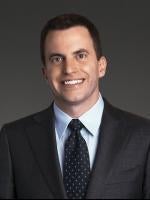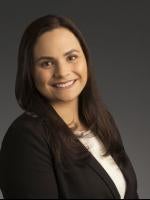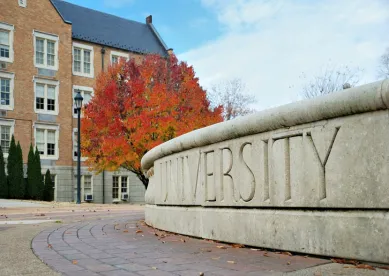This article is the first in a four part series on academic freedom, inspired by the increase in campus protests, controversial speakers, and proliferation of free speech issues on college campuses.
College campuses cannot stop talking about controversial speakers. Most speakers face scant opposition, perhaps a mention in a student newspaper or a small protest. But some incidents have captured national attention. At the University of Connecticut, a student group invited a right-wing blogger to deliver a lecture titled, “It’s OK to be White.”1 Before the speech even began, the audience began chanting, “Go home Nazi.” Things spiraled out of control when a student snatched the blogger’s speech and a scuffle ensued. Sonoma State University faced a similar controversy when a student read a politically charged poem during commencement. The poem promoted Black Lives Matter, disparaged Donald Trump, attacked Fox News, and used several expletives2. The president of the university sparked backlash from students, alumni, and faculty when she apologized for the “mistake.”
Colleges have many options to deal with these incidents. Some support the speaker, angering the offended community members. Others condemn the speech, provoking the speaker, faculty organizations, and sympathetic politicians. Others remain silent, hoping for the storm to pass. When deciding how to respond, colleges should consider the role of academic freedom. Public institutions must additionally consider the First Amendment, but that is beyond the scope of this article. But regardless of the type of institution, the professional norm of academic freedom will loom large in these controversies.
The Competing Rights to Academic Freedom
“Academic freedom” originally meant that a school had the right “to determine for itself on academic grounds who may teach, what may be taught, how it shall be taught, and who may be admitted to study.3” This right goes back to “the Ninth Century, when the first European university was established in Salerno,4” and was rooted in the recognition that “centers of higher learning can best develop and flourish in an atmosphere of liberty and independence5.” Courts have since recognized that “private colleges and universities are governed on the principle of self-regulation free from judicial restraints.”6
But this right to hire and fire at will can conflict with the student or faculty member’s right to academic freedom. Since 1915, the American Associations of University Professors (“AAUP”) has been the primary advocate of this individual right. In its 1915 Declaration of Principles on Academic Freedom and Academic Tenure, the AAUP defined academic freedom as the “complete and unlimited freedom to pursue inquiry.” This right was extended with the organization’s 1964 Statement on Extramural Utterances, which recognized “the right of faculty members to speak or write as citizens, free from institutional censorship or discipline.” One scholar explained, “The heart and soul of academic freedom is the elemental notion that ideas may not be censored.” But he recognized that “those who join a university community may rightly be expected to express their ideas, whatever they may be, in a manner consistent with the highest traditions of learned communities.”7
Conflict between the Competing Rights
Courts have struggled to balance the college’s and individual’s rights. When the speech is vulgar or strays from the speaker’s academic discipline, the institution’s rights prevail. For example, in Bonnell v. Lorenzo, a community college suspended a professor after a student filed a complaint about frequent profanity8. The professor circulated the complaint to 200 faculty members, redacting the student’s identifying information, and attached a satirical response titled “An Apology: Yes, Virginia, There is a Sanity Clause.” The court held that free speech protected his distribution of the complaint and the “apology.” But it did not protect the use of profanity that Hs no relation to the professor’s coursework and that violated the college’s sexual harassment policy.
More recently, a public university terminated a tenured professor for inappropriate and offensive classroom comments and behavior.9 The professor used profanity and discussed her sex life in the classroom. The Fifth Circuit recognized that while “classroom discussion is a protected activity” under academic freedom, even these protections have their limits. The court explained, “students, teachers, and professors are not permitted to say anything and everything simply because the words are uttered in the classroom context.10” The court emphasized that the use of profanity and the offensive discussion at issue was unrelated to her duties as a faculty member.11
The issue gets murkier when the controversial speech involves matters of public concern. For example, the University of Illinois revoked an offer of tenure to a professor because of his controversial statements. Professor Steven G. Salaita had tweeted, “If you’re defending Israel right now, you’re an awful human being” and used obscenities and vitriolic language in denouncing Israel’s military actions in Gaza. At one point, he said, “At this point, if Netanyahu appeared on TV with a necklace made from the teeth of Palestinian children, would anybody be surprised?”
Supporting the revocation, the former president of the AAUP said, “Academic freedom does not require you to hire someone whose views you consider despicable.12” He continued, “It’s not a violation of academic freedom to decide you don’t approve of someone’s publications or their public use of social media. It’s not a violation of academic freedom to decide not to hire someone with a deplorable role as a public intellectual.” But the Illinois division of the AAUP disagreed, calling the decision “a clear violation of Professor Salaita’s academic freedom and an affront to free speech that we enjoy in this country.” The Illinois division argued that nothing in the statements raised questions about Salaita’s fitness to teach and the statements were on social media outside the presence of students. Ultimately, Professor Salaita sued, and the case settled for $875,000. However, the University did not give him the job, and both sides claim it as a win.
Balancing the Competing Rights
Balancing the tension between the rights of institutions and individuals is no easy matter. Colleges must maintain their credibility and message, while the faculty needs the freedom to take intellectual risks13. While the AAUP insists that academic freedom is an individual right, the law generally favors private institutions’ rights14. Balancing those competing rights is difficult, but college administrators can follow a few guiding principles.
Institutions should be wary of curtailing speech. Colleges are the marketplace of ideas and should encourage students and faculty to take academic risks. This not only benefits the broader educational mission, but also avoids the pro-speech backlash that universities have faced from students, alumni, donors, and the AAUP. This is particularly true where the speaker is tenured faculty, triggering a host of tenure guidelines, academic policies, and other considerations.
That said, universities have the right to impose some limits on speech. Academic freedom protects legitimate, serious debate and sincerely held beliefs that are supported with facts, knowledge, science, or data. Institutions have every right to stop harassing, sexist, racist, or vulgar speech. Schools also can limit inflammatory or hateful rhetoric that has no basis in fact. For example, a college could allow a symposium for opposing views on the Israel-Palestine conflict15. But it need not promote conspiracy theories about the Sandy Hook massacre, and other mass shootings16. It is not that provocative speakers or minority opinions themselves should be barred, but schools are on safer footing when the speech they seek to limit is false or hate speech17. After all, “[w]hile the state has no authority to pass judgements on thoughts and expression, the university must pass such judgment18.” While individual institutions will need to decide where to draw the line for themselves, academic freedom gives them the right to do so. Academic resources are limited and so “should not be spent on those who will occupy their time developing arguments for what is plainly false or researching what is obviously of no serious interest.”
1 Karma Allen, Conservative speaker arrested as ‘It’s OK to be White’ event at UConn, ABC News (Nov. 29, 2017), https://abcnews.go.com/US/conservative-speaker-arrested-white-event-uconn/story?id=51451426.
2 Martin Espinoza, Faculty criticize Sonoma State President Judy Sakaki over apology for provocative graduation poem, The Press Democrat (June 7, 2017), https://www.pressdemocrat.com/news/7071979-181/faculty-criticize-sonoma-state-president?artslide=0&sba=AAS.
3 Regents of Univ. of California v. Bakke, 438 U.S. 265, 312 (1978) (quoting Sweezy v. New Hampshire, 354 U.S. 234, 263 (1957) (Frankfurter, J., concurring)).
4 Bilut v. Nw. Univ., 269 Ill. App. 3d 125, 135 (1994).
5 Greene v. Howard Univ., 271 F. Supp. 609, 615 (D.D.C. 1967).
6 Soderbloom v. Yale Univ., No. CV-91-0324553 S, 1992 WL 24448, at *2 (Conn. Super. Ct. Feb. 3, 1992).
7 Rodney A. Smolla, The Constitution Goes to College: Five Constitutional Ideas That Have Shaped the American University 159 (N.Y.U. Press 2011).
8 Bonnell v. Lorenzo, 241 F. 3d 800 (6th Cir. 2001); see also Martin v. Parrish, 805 F. 2d 583 (5th Cir. 1986).
9 Buchanan v. Alexander, 919 F. 3d 847 (5th Cir. 2019).
10 Id. at 852.
11 Id. at 853-854.
12 Peter Schmidt, Denial of Job to Harsh Critic of Israel Divides Advocates of Academic Freedom, The Chronicle of Higher Education (Aug. 7, 2014), https://www.chronicle.com/article/Denial-of-Job-to-Harsh-Critic/148211/.
13 Jay Schalin, Academic Freedom in the Age of Political Correctness, The John William Pope Center for Higher Education Policy 1, 6 (September 2016).
14 Id. at 8.
15 Valerie Richardson, DePaul professor ignites free-speech uproar with unabashed pro-Israel views, Washington Times (May 7, 2019), https://www.washingtontimes.com/news/2019/may/7/jason-hill-israel-support-ignites-depaul-free-spee/. While DePaul University’s Faculty Council rejected Professor Hill’s opinions, they affirmed his right to express and publish those opinions. Furthermore, DePaul University’s President stated the school “holds academic freedom in the highest regard” and emphasized that while Hill’s views were his own, and he did not speak for the university, he would not be taking any action against Hill as a result of his views.
16 Scott Jaschik, University Moves to Fire Sandy Hook Denier, Inside Higher ED (Dec. 17, 2015), https://www.insidehighered.com/news/2015/12/17/florida-atlantic-moves-fire-sandy-hook-denier. A jury later found that the university did not terminate Tracy’s employment because of his conspiracy theory blog, but rather because he consistently broke the rules about disclosure of outside activities and earnings, and refused to follow orders to distance his personal writings from his university role. Paula McMahon, Jury rules against fired FAU pro James Tracy in free speech case, South Florida Sun Sentinel (Dec. 11, 2017), http://www.sun-sentinel.com/local/palm-beach/fl-reg-james-tracy-fau-closings-20171208-story.html.
17 Rodney A. Smolla, The Constitution Goes to College: Five Constitutional Ideas That Have Shaped the American University 98 (New York University Press 2011) (“The enlightened university never punishes opinion merely because it is contrary to orthodoxy. The very idea of orthodoxy is repugnant to the ethos of creativity, invention, and intellectual honesty. Slavish adherence to what has gone before is anathema to the arts and to the scientific method. Yet this is not the same as saying that the university is entirely stripped of moral and legal jurisdiction to judge expression and opinion. The “good life” for the university is not entirely determined by the market. Norms of academic and professional rigor, integrity, and quality are core to the university’s missions of teaching, research and service. A university that does not evaluate thought and expression is incoherent.”).
18 Id





 />i
/>i
